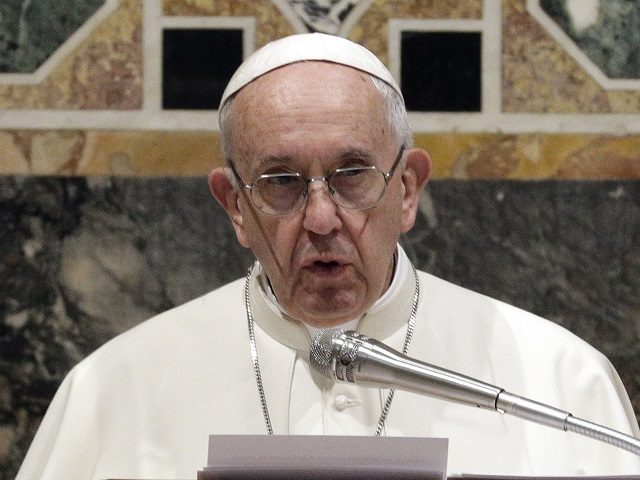The Vatican issued guidelines for an ethical reform of the international economic-financial system on Thursday, just weeks after indicting the former president of the Vatican Bank for embezzlement.
The irony of the Vatican presuming to instruct others on economic conduct while struggling to extricate itself from its own scandal-ridden financial quagmire seems lost on no one, and even Catholic news outlets felt obliged to point out the glaring contradictions in play.
Writing for the online Catholic news site Crux, Claire Giangravè noted that the document “encourages the financial world to learn from the lessons of the latest financial crisis” while failing to mention “the Church’s own struggles with economic management, including the fact that a handful of recent Vatican trials have highlighted cases of misappropriation or corruption.”
The document “condemns fiscal evasion, financial mismanagement, unsurmountable public debt and the increase of offshore accounts,” Ms. Giangravè writes, while curiously omitting “that the Institute for the Works of Religion, informally called the ‘Vatican Bank,’ was for many years seen as a preferred tax haven in Italy, or that its former president is currently on Vatican trial for embezzlement.”
The 11,000-word text, titled Oeconomicae et pecuniariae quaestiones: Considerations for an Ethical Discernment Regarding some Aspects of the Present Economic-Financial System, was issued jointly by the Congregation for the Doctrine of the Faith and the Vatican Department for Promoting Integral Human Development.
Last March, a Vatican court began its trial of Angelo Caloia, who headed the Vatican bank (IOR) for 20 years along with his lawyer, Gabriele Liuzzo. The two men were charged with “unlawful conduct” involving “the disposal of a considerable part of the institute’s real estate assets” and the bank sought compensation of more than 50 million euros.
In February, a Vatican Court found two former senior managers of the Vatican bank guilty of mismanagement, and ordered them to compensate the IOR for damages. The managers were Paolo Cipriani and Massimo Tulli, the IOR’s general director and deputy general director until July 2013, when they stepped down following revelations of the so-called “Scarano case.”
Msgr. Nunzio Scarano was an official at the Vatican’s central bank (APSA) who was charged with corruption and calumny by a court in Rome and with money laundering by a court in Salerno.
Also in February, leaked documents revealed that the Papal Foundation, a U.S.-based charity, had been asked for $25 million to bail out a Church-owned dermatological hospital in Rome, the Istituto Dermopatico dell’Immacolata (IDI), that had gone into bankruptcy after a staggering 800 million euros went “missing.”
A 2015 criminal investigation into corruption at IDI led to an indictment of 40 persons, charged with a total of 144 counts of crimes including fraudulent bankruptcy, the issuance of false invoices, concealment of accounting records, embezzlement, and tax evasion. The alleged financial fraud became one of the Church’s largest economic scandals in recent memory.
The lay board members of the Papal Foundation complained that instead of helping the poor in a third-world country, the bishops had approved an enormous grant to shore up a hospital with a history of mismanagement, criminal indictments, and bankruptcy.
A member of the state oversight commission set up to watch over IDI’s transition, who spoke to Breitbart News earlier this year on condition of anonymity, said that little has changed in the governance of the hospital. The religious order that owned the hospital while funds were being embezzled on a daily basis, the Congregazione dei Figli dell’Immacolata Concezione, continues to own it today, having merely established a new foundation—La Fondazione Luigi Maria Monti—to replace the prior foundation to run the institution.
In other words, the commissioner said, the congregation effectively sold the bankrupt hospital back to itself and now expects wealthy Americans to pay for its financial abuses.
According to the new Vatican document, it is “especially necessary to provide an ethical reflection on certain aspects of financial transactions which, when operating without the necessary anthropological and moral foundations, have not only produced manifest abuses and injustice, but also demonstrated a capacity to create systemic and worldwide economic crisis.”
Unfortunately, the poor timing of the text’s release points inevitably back to the biblical proverb: Medice, cura te ipsum.
“Physician, heal thyself.”
Follow Thomas D. Williams on Twitter Follow @tdwilliams

COMMENTS
Please let us know if you're having issues with commenting.